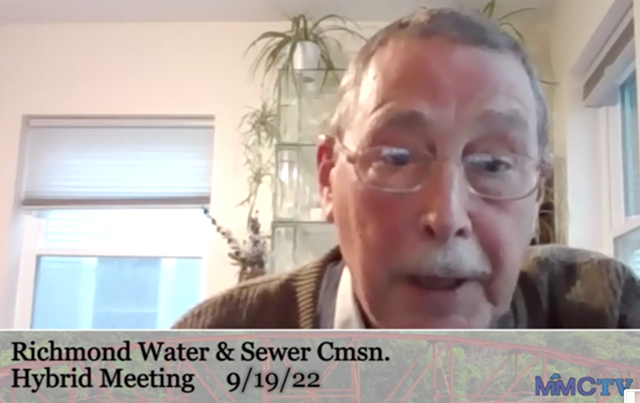Switch to the mobile version of this page.
Vermont's Independent Voice
- News
- Arts+Culture
- Home+Design
- Food
- Cannabis
- Music
- On Screen
- Events
- Jobs
- Obituaries
- Classifieds
- Personals
Browse News
Departments
-
Education

Scott Official Pushes Back on Former State…
-
News

Burlington Budget Deficit Balloons to $13.1 Million
-
Education

Senate Committee Votes 3-2 to Recommend Saunders…
- Court Rejects Roxbury's Request to Block School Budget Vote Education 0
- Norwich University Names New President Education 0
- Media Note: Mitch Wertlieb Named Host of 'Vermont This Week' Health Care 0
Browse Arts + Culture
View All
local resources
Browse Food + Drink
View All
Browse Cannabis
View All
-
Culture

'Cannasations' Podcaster Kris Brown Aims to 'Humanize'…
-
True 802

A Burlington Cannabis Shop Plans to Host…
-
Business

Judge Tosses Burlington Cannabiz Owner's Lawsuit
-
Health + Fitness

Vermont's Cannabis Nurse Hotline Answers Health Questions…
-
Business

Waterbury Couple Buy Rare Vermont Cannabis License
Browse Music
View All
Browse On Screen
Browse Events
Browse Classifieds
Browse Personals
-

If you're looking for "I Spys," dating or LTRs, this is your scene.
View Profiles
Special Reports
Pubs+More
Richmond Learns a Town Official Lowered the Fluoride Level in Its Water for Years
Published September 28, 2022 at 11:32 p.m. | Updated October 25, 2022 at 7:51 p.m.
An employee of the Town of Richmond may be in hot water for reducing the level of fluoride in the town’s drinking water for years without the public’s knowledge or the consent of town leaders.
Water superintendent Kendall Chamberlin, a 37-year worker, acknowledged during a September 19 meeting of the town’s Water and Sewer Commission that he lowered the fluoride level to less than half of what's recommended by the state due to his own safety concerns.
Fluoride has been added to many public drinking water supplies in Vermont and across the nation for decades to prevent tooth decay, particularly in children. It has been shown to be a cost-effective way to improve oral health.
While fluoridation has critics, the practice “is considered one of the 10 great public health achievements of the 20th century,” according to the Vermont Department of Health.
Chamberlin told commissioners he decided to reduce the levels several years ago because “a couple” of water system users told him they were against fluoridation and he preferred to be “ahead of the curve” when it comes to removing chemicals from the water supply.
“I think to err on the side of caution is not a bad position to be in,” Chamberlin told the commission.
But now it's Chamberlin who finds himself in a bad position, facing criticism from state health officials, residents, the commission chair and Richmond's town manager.
A follow-up meeting is scheduled for Monday, and Chamberlin, who also sits on the Essex Selectboard, acknowledged he may face disciplinary action given the intense criticism he has received from the public on what he called a “hot-button issue.”
Water superintendent Kendall Chamberlin, a 37-year worker, acknowledged during a September 19 meeting of the town’s Water and Sewer Commission that he lowered the fluoride level to less than half of what's recommended by the state due to his own safety concerns.
Fluoride has been added to many public drinking water supplies in Vermont and across the nation for decades to prevent tooth decay, particularly in children. It has been shown to be a cost-effective way to improve oral health.
While fluoridation has critics, the practice “is considered one of the 10 great public health achievements of the 20th century,” according to the Vermont Department of Health.
Chamberlin told commissioners he decided to reduce the levels several years ago because “a couple” of water system users told him they were against fluoridation and he preferred to be “ahead of the curve” when it comes to removing chemicals from the water supply.
“I think to err on the side of caution is not a bad position to be in,” Chamberlin told the commission.
But now it's Chamberlin who finds himself in a bad position, facing criticism from state health officials, residents, the commission chair and Richmond's town manager.
A follow-up meeting is scheduled for Monday, and Chamberlin, who also sits on the Essex Selectboard, acknowledged he may face disciplinary action given the intense criticism he has received from the public on what he called a “hot-button issue.”
“I would expect that’s probably where they are headed,” Chamberlin told Seven Days on Wednesday, referring to the town’s five-member Water and Sewer Commission.
The commission's September 19 meeting was an unusually contentious one.
Residents, including two physicians, blasted Chamberlin’s move as a misguided, secret decision based on his personal opinions.
“For a single person to unilaterally make the decision that this public health benefit might not be warranted is inappropriate,” retired physician Allen Knowles told the commission. “I think it’s outrageous.”
“I now have an 8-month-old granddaughter that I thought was getting fluoridated water as her permanent teeth are up in her gums developing, and she hasn’t been,” Knowles said.
Another physician, Paul Parker, told the commission he had been operating under the belief the town was following state guidance about an appropriate fluoride level. Because of the “misinformation” about the level, Parker said, he hasn’t been prescribing supplements to people on town water.
“I’m really concerned that one individual is deciding not to fluoridate to recommended levels without informing any of us — just doing it behind the scenes,” Parker said. A local dentist who couldn't attend the meeting shares his concern, he said.
Chamberlin denied doing anything secretive and said he must make numerous decisions as the superintendent of the town's water and wastewater system.
But Chamberlin should have been more forthcoming so that the state Department of Health understood that Richmond’s fluoride level fell well below its recommendations, Arneson said.
Richmond's water system, which serves about 1,000 people, has had fluoride added to its water under a state program since 1983. Twenty-nine municipal water systems serving 213,000 customers in Vermont fluoridate their water, accounting for about 56 percent of state residents on municipal water. Most smaller systems don't fluoridate.
The Department of Health follows guidance from the federal Centers for Disease Control and Prevention that, since 2015, recommends water be fluoridated to 0.7 parts per million.
But Chamberlin decided to reduce the level to around 0.3 parts per million, citing a host of concerns about fluoride in water. The state assumed — and publicly reported — that Richmond was following the guidelines when it wasn’t, Arneson said.
Just how long the fluoride level has been below the recommended 0.7 parts per million is not clear. Chamberlin, who began working for the department during his college days in 1985, said he’s going back and gathering the data, but doesn’t remember when he reduced the level, saying it's always been a moving target.
He said he recalled lowering it amid media reports about chemicals in dog food and baby formula from China, including one quoting a U.S. senator questioning the wisdom of using fluoride from China in U.S. water supplies.
“Now you’re adding a toxic chemical directly to the water supply from China?” Chamberlin told Seven Days. “I’m sorry, fluoride is a poison.”
He shared a Vermont Department of Health press release from 2011 that announced plans to lower the recommended fluoride level from a range of 0.7 to 1.2 parts per million to the “optimum level” of 0.7 parts per million. That indicated to him that the federal and state health officials didn’t really know what a safe level was, he said.
Robin Miller, oral health director for the Department of Health, told commissioners that the state lowered its guidance to water systems in 2015 to 0.7 parts per million.
Miller said she became aware in April that Richmond has been consistently below that level and brought it to the attention of Chamberlin, who “seemed amenable” to change. But for the next several months “we saw no improvement,” she said.
“The people in Richmond and the health care providers that take care of the people in Richmond are all working under the assumption that the water is fluoridated because that was what the health department and the CDC are telling them, when, for all intents and purposes, it’s not,” she told commissioners.
That’s when, she said, she notified Arneson, the town manager, of the issue. He brought it to the commission for discussion. Miller did not return a call for comment on Wednesday.
Commissioners seemed skeptical of many of Chamberlin’s explanations, which ranged from concerns about the safety of fluoride from China to staffing shortages to the voluntary nature of the state’s fluoridation program.
Commissioner Bard Hill acknowledged that he had spoken to Chamberlin in the past about fluoride but made it clear that the commission didn’t support reducing the level. He acknowledged, however, that he had failed to keep track of the town’s reports to the state showing far lower fluoride levels than state guidance suggests.
“It was my perception that — my inadequate attention to the levels in the reports notwithstanding — that we were shooting for the standards set by the CDC and the Department of Health,” Hill said.
Chamberlin said he has been keeping fluoride in the water and therefore feels that he has been conforming to the commission's wishes, even if the precise level was never discussed.
"I guess there's a misinterpretation there because [Hill] was very clear to keep fluorinating the water, and that is what we have done," Chamberlin said.
In a recent post on Front Porch Forum, David Sander, chair of the commission, apologized for “the concerns and confusion this fluoridation situation caused.”
He wrote that the commission planned to “move responsibly and expeditiously” to address the issue at its Monday meeting "within the constraints of Vermont’s Open Meeting Law.” That could be a signal that the board may go into executive session. Sander wrote that the commission planned to address the “policy and the personnel issues” surrounding the issue.
Correction, September 29, 2022: A previous version of this story misstated the number of positions on Richmond's Water and Sewer Commission.
The commission's September 19 meeting was an unusually contentious one.
Residents, including two physicians, blasted Chamberlin’s move as a misguided, secret decision based on his personal opinions.
“For a single person to unilaterally make the decision that this public health benefit might not be warranted is inappropriate,” retired physician Allen Knowles told the commission. “I think it’s outrageous.”
click to enlarge 
Instead of keeping people safe, as Chamberlin claims, his actions actually put people at risk of greater oral health problems, Knowles said.
- Screenshot ©️ Seven Days
- Allen Knowles addressing the Richmond Water and Sewer Commission
“I now have an 8-month-old granddaughter that I thought was getting fluoridated water as her permanent teeth are up in her gums developing, and she hasn’t been,” Knowles said.
Another physician, Paul Parker, told the commission he had been operating under the belief the town was following state guidance about an appropriate fluoride level. Because of the “misinformation” about the level, Parker said, he hasn’t been prescribing supplements to people on town water.
“I’m really concerned that one individual is deciding not to fluoridate to recommended levels without informing any of us — just doing it behind the scenes,” Parker said. A local dentist who couldn't attend the meeting shares his concern, he said.
Chamberlin denied doing anything secretive and said he must make numerous decisions as the superintendent of the town's water and wastewater system.
“As an operator, every time I make an operating decision, I don't tell everybody about it,” he said.
Richmond town manager Josh Arneson praised Chamberlin’s motives but questioned his methods. “I think he does come from a place of wanting to make sure the water is safe and it's of high quality,” Arneson said. But Chamberlin should have been more forthcoming so that the state Department of Health understood that Richmond’s fluoride level fell well below its recommendations, Arneson said.
Richmond's water system, which serves about 1,000 people, has had fluoride added to its water under a state program since 1983. Twenty-nine municipal water systems serving 213,000 customers in Vermont fluoridate their water, accounting for about 56 percent of state residents on municipal water. Most smaller systems don't fluoridate.
The Department of Health follows guidance from the federal Centers for Disease Control and Prevention that, since 2015, recommends water be fluoridated to 0.7 parts per million.
But Chamberlin decided to reduce the level to around 0.3 parts per million, citing a host of concerns about fluoride in water. The state assumed — and publicly reported — that Richmond was following the guidelines when it wasn’t, Arneson said.
Just how long the fluoride level has been below the recommended 0.7 parts per million is not clear. Chamberlin, who began working for the department during his college days in 1985, said he’s going back and gathering the data, but doesn’t remember when he reduced the level, saying it's always been a moving target.
He said he recalled lowering it amid media reports about chemicals in dog food and baby formula from China, including one quoting a U.S. senator questioning the wisdom of using fluoride from China in U.S. water supplies.
“Now you’re adding a toxic chemical directly to the water supply from China?” Chamberlin told Seven Days. “I’m sorry, fluoride is a poison.”
He shared a Vermont Department of Health press release from 2011 that announced plans to lower the recommended fluoride level from a range of 0.7 to 1.2 parts per million to the “optimum level” of 0.7 parts per million. That indicated to him that the federal and state health officials didn’t really know what a safe level was, he said.
Robin Miller, oral health director for the Department of Health, told commissioners that the state lowered its guidance to water systems in 2015 to 0.7 parts per million.
Miller said she became aware in April that Richmond has been consistently below that level and brought it to the attention of Chamberlin, who “seemed amenable” to change. But for the next several months “we saw no improvement,” she said.
“The people in Richmond and the health care providers that take care of the people in Richmond are all working under the assumption that the water is fluoridated because that was what the health department and the CDC are telling them, when, for all intents and purposes, it’s not,” she told commissioners.
That’s when, she said, she notified Arneson, the town manager, of the issue. He brought it to the commission for discussion. Miller did not return a call for comment on Wednesday.
Commissioners seemed skeptical of many of Chamberlin’s explanations, which ranged from concerns about the safety of fluoride from China to staffing shortages to the voluntary nature of the state’s fluoridation program.
Commissioner Bard Hill acknowledged that he had spoken to Chamberlin in the past about fluoride but made it clear that the commission didn’t support reducing the level. He acknowledged, however, that he had failed to keep track of the town’s reports to the state showing far lower fluoride levels than state guidance suggests.
“It was my perception that — my inadequate attention to the levels in the reports notwithstanding — that we were shooting for the standards set by the CDC and the Department of Health,” Hill said.
Chamberlin said he has been keeping fluoride in the water and therefore feels that he has been conforming to the commission's wishes, even if the precise level was never discussed.
"I guess there's a misinterpretation there because [Hill] was very clear to keep fluorinating the water, and that is what we have done," Chamberlin said.
Arneson said he cannot find any reference to the commission addressing the fluoride level since he's worked as Richmond manager since 2018.
In a recent post on Front Porch Forum, David Sander, chair of the commission, apologized for “the concerns and confusion this fluoridation situation caused.”
He wrote that the commission planned to “move responsibly and expeditiously” to address the issue at its Monday meeting "within the constraints of Vermont’s Open Meeting Law.” That could be a signal that the board may go into executive session. Sander wrote that the commission planned to address the “policy and the personnel issues” surrounding the issue.
Correction, September 29, 2022: A previous version of this story misstated the number of positions on Richmond's Water and Sewer Commission.
Related Stories
Got something to say?
Send a letter to the editor
and we'll publish your feedback in print!
More By This Author
About The Author

Kevin McCallum
Bio:
Kevin McCallum is a political reporter at Seven Days, covering the Statehouse and state government. He previously was a reporter at The Press Democrat in Santa Rosa, Calif.
Kevin McCallum is a political reporter at Seven Days, covering the Statehouse and state government. He previously was a reporter at The Press Democrat in Santa Rosa, Calif.
Speaking of...
-

Richmond’s Relaunched Kitchen Table Doubles Down on Comfort Food
Feb 20, 2024 -

Richmond’s Big Spruce Shifts Menu, Adds Breakfast and Lunch
Feb 6, 2024 -

Q&A: Eliot Lothrop Found His Dream Restoration Project in a Richmond Barn
Aug 30, 2023 -

Video: Restoring the East Monitor Barn in Richmond With Eliot Lothrop
Aug 24, 2023 -

New Version of the Kitchen Table to Open in Richmond
Aug 8, 2023 - More »
Comments
Comments are closed.
From 2014-2020, Seven Days allowed readers to comment on all stories posted on our website. While we've appreciated the suggestions and insights, right now Seven Days is prioritizing our core mission — producing high-quality, responsible local journalism — over moderating online debates between readers.
To criticize, correct or praise our reporting, please send us a letter to the editor or send us a tip. We’ll check it out and report the results.
Online comments may return when we have better tech tools for managing them. Thanks for reading.
- 1. A Former MMA Fighter Runs a Wildlife Rehabilitation Center in Cabot News
- 2. Scott Official Pushes Back on Former State Board of Ed Chair's Testimony Education
- 3. Home Is Where the Target Is: Suburban SoBu Builds a Downtown Neighborhood Real Estate
- 4. Burlington Budget Deficit Balloons to $13.1 Million News
- 5. Vermont Rep. Emilie Kornheiser Sees Raising Revenue as Part of Her Mission Politics
- 6. Legislature Advances Measures to Improve Vermont’s Response to Animal Cruelty Politics
- 7. Dog Hiking Challenge Pushes Humans to Explore Vermont With Their Pups True 802
- 1. Totally Transfixed: A Rare Eclipse on a Bluebird Day Dazzled Crowds in Northern Vermont 2024 Solar Eclipse
- 2. Zoie Saunders, Gov. Scott’s Pick for Education Secretary, Faces Questions About Her Qualifications Education
- 3. Don't Trash Those Solar Eclipse Glasses! Groups Collect Them to Be Reused 2024 Solar Eclipse
- 4. State Will Build Secure Juvenile Treatment Center in Vergennes News
- 5. Vermont Awarded $62 Million in Federal Solar Incentives News
- 6. Queen of the City: Mulvaney-Stanak Sworn In as Burlington Mayor News
- 7. New Jersey Earthquake Is Felt in Vermont News







































